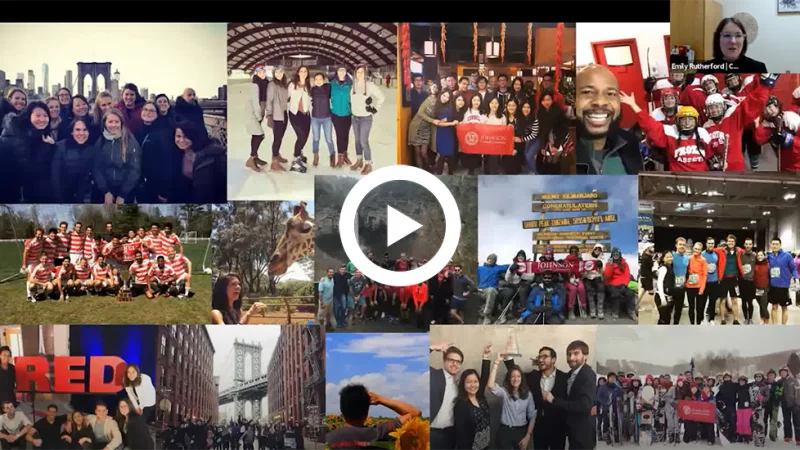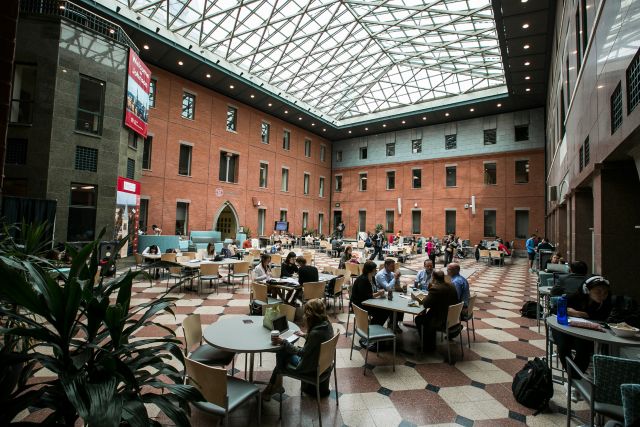
What is life like after an MBA? Unimy recently hosted Cornell Johnson for an in-depth webinar designed to answer this and many more questions. Register to watch it.
Emily Rutherford, Associate Director of Admissions & Scholarship at Cornell University's Samuel Curtis Johnson Graduate School of Management provided an overview of the school’s two-year MBA program. She was joined by Rahul Shahani, Johnson MBA class of 2016, who now works as a partner with McKinsey in New York and leads the firm’s Manufacturing & Supply Chain practice.
A tailored curriculum and NYC course options
Emily’s overview of Johnson’s two-year MBA program touched on immersions, campus options, career outcomes, and the admissions and application process. The program is unique in that it wants to make sure that participants get a solid foundation in business, but also can customize their experience. Each student is required to choose one of seven immersions, which are specializations that offer intense hands-on experience under real business conditions. Another differentiator of the Johnson MBA is the Leadership programs, which represent a range of workshops and activities designed to train leaders to have “competence, character, compassion, and courage.” The graduate business school is based in Ithaca, the Finger Lakes region of New York, but there are options to study in New York City as well.
Emily then turned it over to Rahul, who started by underscoring the value of the community at Johnson:
“I have been gone from the school for eight years at this point, but I still have connections with many of the people who came through the program, and that’s just the nature of how the alumni community interacts with the student community over the years.”
Coming out of undergrad studies, Rahul felt he didn’t have the core intrinsic skills to boost his career. He was technically proficient, but he sensed he didn’t have the leadership capacity required to navigate the business world. He began looking for the right business school and ultimately set his sights on Johnson:
“The moment I walked into Sage Hall, the main building of Johnson, it just felt like home. It felt welcoming, it felt like I was in a place where I could come in and be myself, challenge myself, make mistakes, fail, and still figure it out and be successful.”

Rahul went on to express his amazement at people just popping up to say ‘hi’:
“It gave me a warm feeling and I said to myself, well, I can see myself being here for the next two years. To this day, this [enrolling in Johnson] is the best decision I’ve ever made in my life.”
Cornell prides itself on its culture and community, which it calls the Big Red family, a reference to both its nickname ‘Big Red’ and one of its official colors. Cornell’s community has consistently received high marks from alumni, and most recently the Financial Times ranked the school as No.1 for alumni network. Separately, Unimy’s MBA Cultural Fit research, which looks into the culture and community of top MBAs across the world, found that Johnson has a strong emphasis on teamwork.
Rahul said that even after eight years he is still actively involved with Johnson and keeps in touch with alumni, students, and staff. He helps McKinsey’s recruiting program for Johnson and comes down to campus several times a year - connecting with students One-on-One. He also guest-lectures in certain consulting-related classes and helps Johnson shape its curriculum so that the experience for students is relevant to the industry.
Careers driven by a focus on leadership
Demand for Johnson MBA alumni is strong. About 97% of the class of 2022 received offers and 95% of those accepted offers. The average annual salary is USD 155,000 a year, excluding bonuses and stock options.
Asked about the most important aspect of his time at Johnson, Rahul pointed to the focus on leadership:
“At the end of the day this is what companies are expecting from MBAs,” he said, adding that the cohort of people McKinsey hired from Johnson have a heightened sense of being community leaders.
He concluded:
“Johnson gives you a sandbox of innovation where you can lead and build yourself and come out as a leader.”
Register to watch the full recording of “The Cornell Difference: Life after the MBA” webinar.
Comments